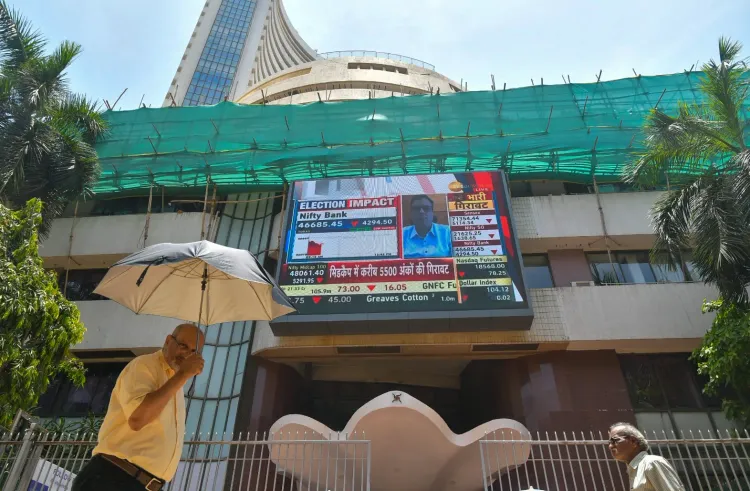How Did the Indian Stock Market React to US Tariffs?

Synopsis
Key Takeaways
- Indian stock market showed resilience against US tariffs.
- FMCG stocks were a key driver of market interest.
- Slight declines were observed across broader indices.
- Investors are favoring non-discretionary sectors.
- The market is adapting to external pressures.
Mumbai, July 31 (NationPress) The Indian stock market experienced a slight decline following a day filled with fluctuations on Thursday. The domestic indices exhibited remarkable resilience, successfully avoiding a significant downturn after the US imposed tariffs on India, largely due to increased buying in FMCG stocks.
The Sensex concluded the day at 81,185.58, down by 296.28 points or 0.36 percent. The 30-share index opened trading with a notable drop at 80,695.50, compared to the previous close of 81,481.86. Despite showing some strength, erasing early losses, and briefly turning positive in the afternoon with an intraday high of 81,803.27, the index couldn't maintain its momentum during the final hour, impacted by monthly expiry.
The Nifty closed at 24,768.35, down 86.70 points or 0.35 percent.
Analysts believe that India’s true strength lies in its economic resilience.
Among the Sensex constituents, Tata Steel, Sun Pharma, NTPC, Reliance, Asian Paints, L&T, and Titan were the biggest losers, while Hindustan Unilever, Eternal, ITC, and Kotak Mahindra Bank finished in the green.
The broader market faced selling pressure as well, with Nifty 100 dropping 95 points or 0.38 percent, Nifty Mid cap 100 falling 541 points or 0.93 percent, and Nifty Small cap 100 ending 190 points or 1.05 percent lower.
In contrast, Nifty FMCG surged 791 points or 1.44 percent, fueled by buying interest, particularly for Hindustan Unilever after it announced strong Q1 earnings.
Other sectoral indices closed in negative territory, with Nifty Auto down 89 points, Nifty IT slipping 180 points, and Nifty Bank closing 188 points lower.
Despite a strong recovery attempt after a sharp decline, the domestic market ended with slight losses on a monthly expiry day.
“Investors were drawn to domestically focused, non-discretionary stocks, particularly in the FMCG sector, due to attractive valuations, positive demand outlook, and relative safety from tariff risks,” analysts noted.










